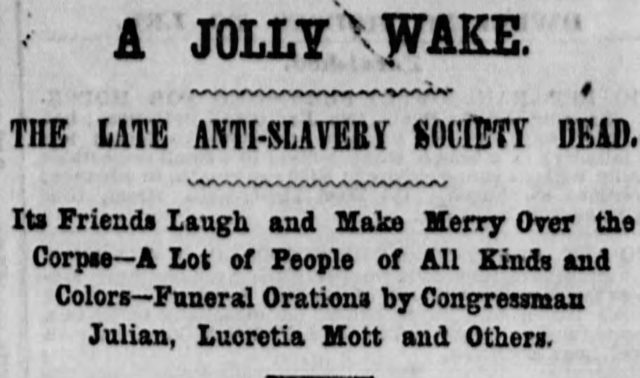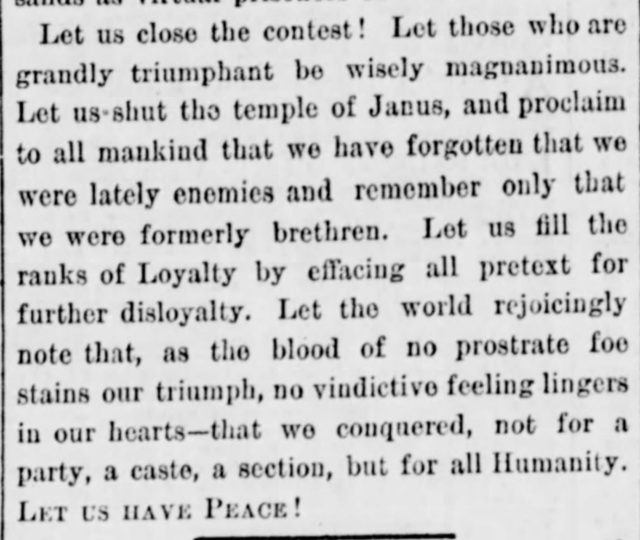“There is going to be a big time here in N.Y. when the 15th Amendment has become a law.”
Lavinia Goodell, March 6, 1870
The 15th Amendment, which provides, “The right of citizens of the United States to vote shall not be denied or abridged by the United States or by any State on account of race, color, or previous condition of servitude,” was ratified in early 1870. Lavinia Goodell had grown up in a staunchly abolitionist family and had assisted her father in publishing the anti-slavery newspaper the Principia during the Civil War. The Goodells found the passage of the 15th Amendment a great cause for celebration.
Lavinia wrote to her parents, “There is going to be a big time here in N.Y. when the 15th Amendment has become a law.”

Lavinia participated in two days of festivities, starting on April 8. Horace Greeley’s New York Tribune reported:
This day, the Colored Men of our City celebrate . . . the completion of the good work of their Emancipation by the ratification of the XVth Amendment to the Federal Constitution. We ardently trust that the day may be propitious, and that all may unite in the fervent hope that the rights won for the Black race may be so exercised as to benefit not themselves only, but our whole People.
Greeley concluded:

The following day, Lavinia attended the final meeting of the American-Anti-Slavery Society, as it met to disband its organization since its purpose had finally been accomplished. She reported to her parents:
Speeches were made by Fred Douglass, Wendell Phillips, Blake Foster, Abby Kelly, Mary Green, Lucretia Mott, Henry C. Wright, and pretty much all the old Garrisonians, excepting Garrison, who you know “dried up,” as the boys say, some years ago. The meeting was a characteristic one – a good deal of self laudation . . . together with considerable humor, some noble sentiments, affectionate and touching reminiscences and much jollification.
Geo. W. Julian and Wm. H. Channing made excellent speeches in the evening. I have a special affection for Mr. Julian on account of his position on the woman question. (Editor’s note: Although the 15th Amendment enfranchised Black men, women were still unable to vote. For this reason, although Elizabeth Cady Stanton and Susan B. Anthony had been firm abolitionists, they did not support the Amendment.) . . . Julia Ward Howe read an original poem. She is a woman whose interests I admire very much and whom I had never seen before. . . .
The New York Daily Herald called the occasion “a jolly wake, saying, “The friends and relatives of the lately deceased Anti-Slavery Society held a wake over its corpse last evening at Apollo Hall.” The Harold noted that Lucretia Mott “said that she hoped before the proceedings closed they should have something to say not only about woman’s rights, but land reform.”
Horace Greeley commended the Anti-Slavery Society and looked hopefully to the future, saying:
Seldom has so small a body contended so persistently, unflinchingly, for so great a truth; seldom has a cause which, at the outset, seemed to ordinary vision so hopeless, achieved such unqualified triumph in the lifetime of its first apostles.
That triumph is of moment not alone in our country. It tolls the knell of Human Bondage throughout the civilized world. . . . It may take a few more years to banish the last vestiges of human chattelhood from tropical America; but the end is no longer doubtful nor remote. The dawn of the next century will irradiate no slave-hut in Christendom.
Sources consulted: Lavinia Goodell’s letters to her parents (March 6, 1870, April 1870); New York Tribune (April 8, 1870; April 12, 1870); New York Daily Herald (April 10, 1870); https://wams.nyhistory.org/industry-and-empire/fighting-for-equality/suffrage-and-the-fifteenth-amendment/#:~:text=The%2015th%20amendment%2C%20first%20proposed,include%20voting%20rights%20for%20women.







